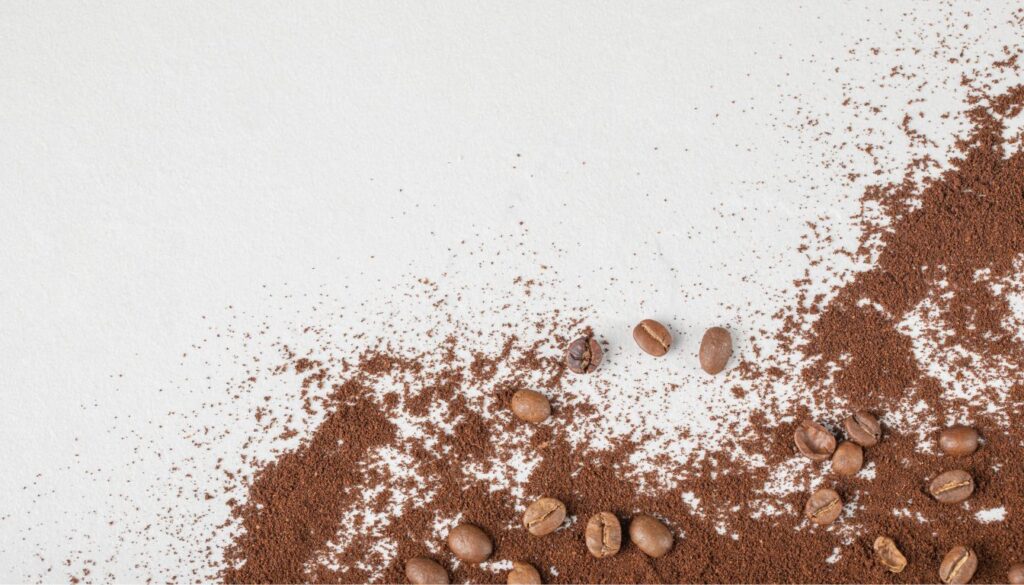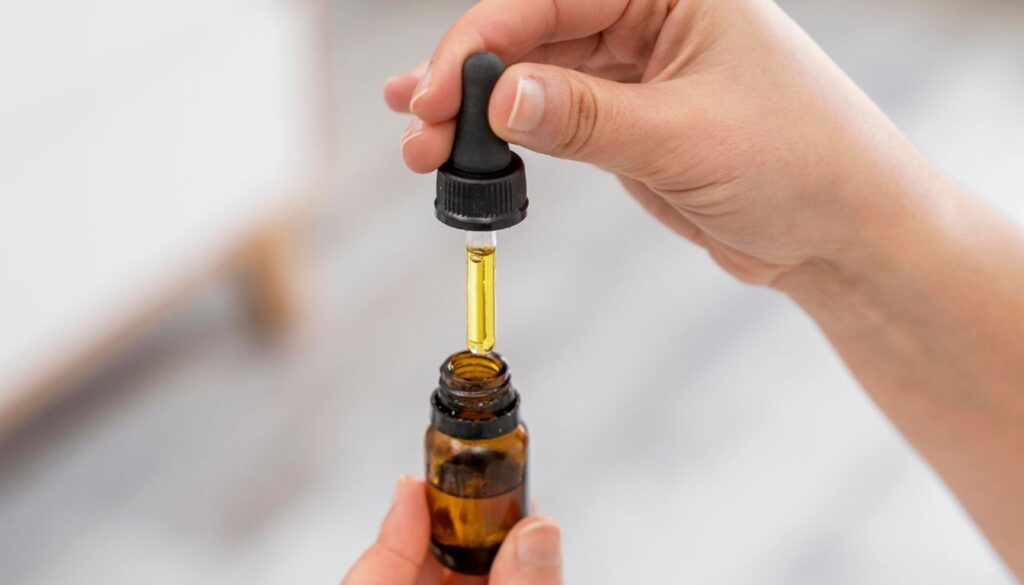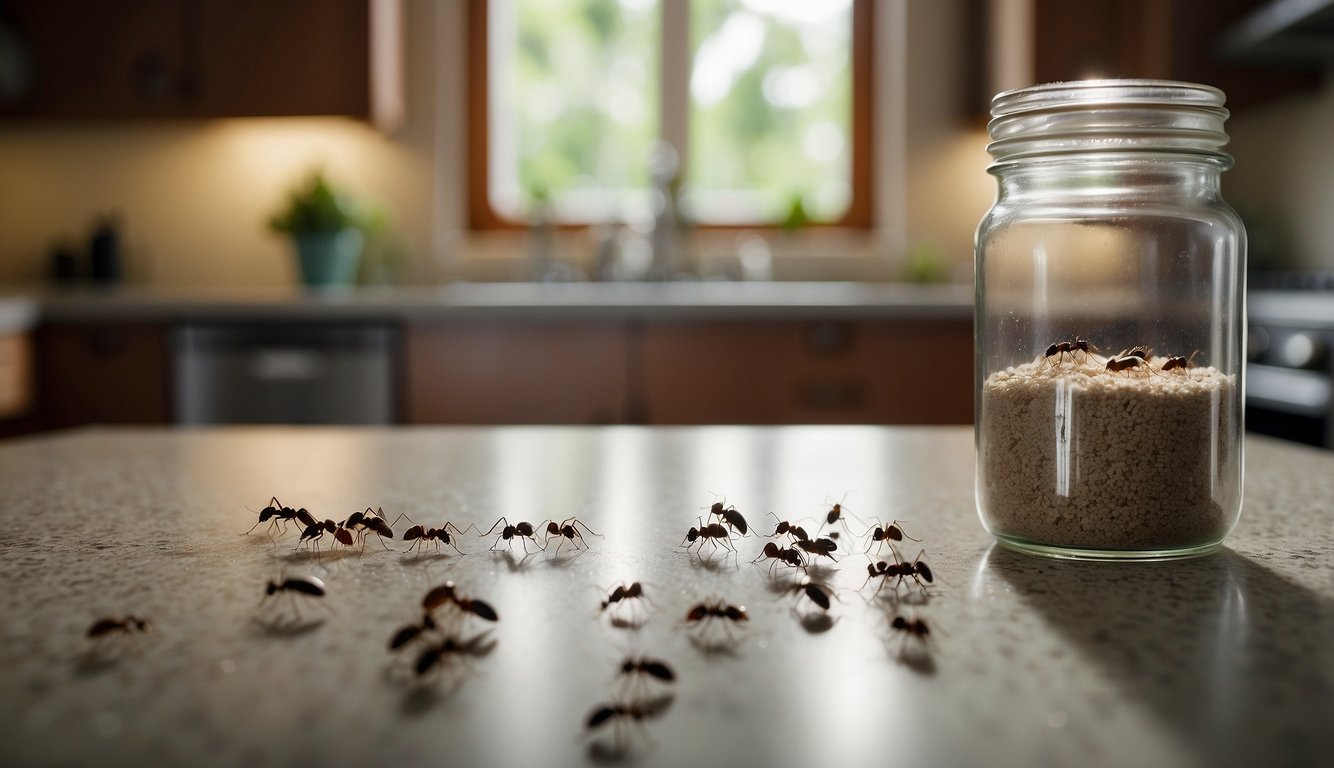Ants are a common household pest that can be difficult to eliminate. Let’s look at ant control home remedies in this article! While professional pest control services can be effective, they can also be expensive. Fortunately, many natural home remedies for ant control can be just as effective and much more affordable.
One of the most effective natural methods for ant control is using vinegar. Ants dislike the smell of vinegar and will avoid areas that have been treated with it. Simply mix equal parts vinegar and water in a spray bottle and spray the solution around doorways, windowsills, and other areas where ants are entering your home.
Another natural ant control method is using peppermint oil. Ants are repelled by the strong scent of peppermint, so placing a few drops of peppermint oil on cotton balls and placing them around your home can help keep ants away. You can also mix a few drops of peppermint oil with water in a spray bottle and spray the solution around your home to repel ants.
Understanding Ant Behavior – Ant Control Home Remedy
As someone who has dealt with ant infestations in the past, I know how frustrating it can be to have these tiny creatures invade your home. Understanding ant’s behavior is key to effectively controlling and preventing ant infestations. In this section, I will discuss the ant colony structure and common types of household ants.
Ant Colony Structure
Ants are social insects that live in colonies. Each colony has a queen whose primary role is to lay eggs. The queen is the largest ant in the colony and can live for several years. Worker ants, which are sterile females, are responsible for foraging for food, caring for the queen and young, and defending the colony.
Male ants, also known as drones, are responsible for mating with the queen. Ant colonies are organized into a hierarchy, with the queen at the top and the worker ants at the bottom.
The queen produces pheromones that keep the colony organized and cohesive. Worker ants communicate with each other through the use of pheromones, which they leave behind as they move around the colony.
Common Types of Household Ants
Several types of ants commonly invade homes. Each type of ant has its unique behavior and characteristics.
- Carpenter ants: These ants are attracted to damp wood and can cause significant damage to wooden structures if left unchecked.
- Odorous house ants: These ants get their name from the unpleasant odor they emit when crushed. They are attracted to sugary foods and can be found in kitchens and pantries.
- Pharaoh ants: These ants are small and yellowish-brown in color. They are attracted to sweet and greasy foods and can be found in kitchens and bathrooms.
- Pavement ants: These ants are small and brownish-black in color. They are attracted to sweets and can be found in kitchens and pantries.
Preventive Measures – Ant Control Home Remedy: Effective Solutions
As the saying goes, “prevention is better than cure.” Here are some preventive measures you can take to avoid ant infestations in your home.
Securing Food Sources
Ants are attracted to food sources. It is important to store food in airtight containers to prevent ants from accessing it. This includes pet food as well. Leaving pet food out in the open can attract ants. Also, make sure to clean up any spills or crumbs immediately.
Ants are attracted to sugar and protein. Therefore, it is important to keep these food sources out of reach. Store sugar in airtight containers and clean up any spills immediately. Protein sources such as meat should be stored in the refrigerator.
Maintaining Cleanliness
Ants are attracted to moisture. Therefore, it is important to fix any leaks in your home. This includes leaky faucets, pipes, and air conditioning units. Ants are also attracted to dirty dishes and garbage. Therefore, it is important to clean up after meals and take out the garbage regularly.
Sealing Entry Points
Ants can enter your home through small cracks and openings. It is important to seal these entry points to prevent ants from entering. This includes sealing around windows and doors, as well as sealing any cracks in your foundation.
Natural Ant Repellents – Ant Control Home Remedy
As a homeowner, I understand the frustration that comes with an ant infestation. Fortunately, there are natural ant repellents that can help keep these pesky insects at bay. Here are a few effective methods:
Using Citrus Peels
Ants are repelled by the scent of citrus, making it an excellent natural repellent. Simply save your citrus peels (lemon, lime, orange, etc.) and place them near ant entry points. You can also make a citrus spray by boiling citrus peels in water, straining the mixture, and spraying it around your home.
Essential Oils as Deterrents – Ant Control Home Remedy
Essential oils like peppermint, tea tree, and eucalyptus are natural ant deterrents. Simply mix a few drops of the oil with water and spray it around ant entry points. You can also soak a cotton ball in the oil and place it near ant entry points.
Diatomaceous Earth Applications
Diatomaceous earth is a natural, non-toxic substance that can be used to kill ants. This fine powder is made up of the fossilized remains of diatoms, a type of algae. When ants come into contact with diatomaceous earth, it dries out their exoskeletons and kills them.
Simply sprinkle diatomaceous earth around ant entry points and other areas where ants are present. Remember, natural ant repellents may take some time to work, and may not be as effective as chemical sprays. However, they are a safe and eco-friendly alternative that can help keep your home ant-free.
Homemade Ant Baits and Traps – Ant Control Home Remedy: Effective Solutions
As someone who has dealt with an ant infestation before, I know how frustrating it can be to have these tiny creatures marching through your home. Luckily, several homemade ant baits and traps are effective in controlling these pests. Here are a few options:
Boric Acid and Sugar Solutions
One of the most popular homemade ant baits is a solution made of boric acid and sugar. Boric acid is a naturally occurring substance that is toxic to ants. When combined with sugar, it attracts ants and they will consume the mixture, bringing it back to their colony and ultimately killing the entire colony.
To make this solution, mix one-part boric acid with three parts sugar and enough water to create a syrupy consistency. Place the mixture in small containers, such as bottle caps, and place them in areas where you have seen ant activity. Be sure to keep the solution away from children and pets, as boric acid can be harmful if ingested.
Protein-Based Baits for Ant Control Home Remedy
Another effective homemade ant bait is a protein-based solution. Ants are attracted to protein, so this type of bait can be especially effective. Mix equal parts of peanut butter and honey and add a few drops of water to create a paste. Place the paste on small pieces of cardboard or in bottle caps and place them in areas where you have seen ant activity.
You can also use cornmeal as a protein-based bait. Ants are unable to digest cornmeal, so when they consume it, it expands in their stomachs and ultimately kills them. Sprinkle cornmeal in areas where you have seen ant activity and wait for the ants to consume it.
Liquid Dish Soap and Water Mixtures
A simple and effective homemade ant trap can be made using liquid dish soap and water. Mix equal parts of water and liquid dish soap and pour the mixture into a spray bottle. When you see ants, spray them with the mixture. The soap will disrupt their ability to walk and breathe, ultimately killing them.
Physical Barriers and Obstacles – Ant Control Home Remedy

Ants can be deterred from entering your home by creating physical barriers and obstacles that they cannot cross. Here are a few effective methods:
Chalk and Talcum Powder Lines
Chalk and talcum powder can be used to create barriers that ants will not cross. Simply draw a line of chalk or sprinkle talcum powder along the areas where ants are entering your home. The powder will stick to the ants’ bodies and dehydrate them, causing them to die. Reapply the powder or chalk as needed, especially after rain or if it gets disturbed.
Coffee Grounds Perimeter
Coffee grounds can also be used to create a barrier that ants will not cross. Simply sprinkle used coffee grounds around the perimeter of your home or in areas where ants are entering. The strong scent of coffee masks the ants’ pheromone trails, making it difficult for them to find their way. Additionally, the acidity of the coffee can repel ants. Make sure to replace the coffee grounds every few days to keep the scent strong.
Common Household Substances – Ant Control Home Remedy: Effective Solutions
As a homeowner, it’s important to know that you don’t always have to resort to toxic chemicals to get rid of ants. Some common household substances can be just as effective at deterring ants from entering your home. Here are a few examples:
Vinegar as an Ant Deterrent
White vinegar is a versatile cleaning agent that can also be used to deter ants. Ants rely on scent trails to navigate, and vinegar disrupts these trails by masking the scent markers they leave behind.
To use vinegar as an ant deterrent, mix equal parts white vinegar and water in a spray bottle and apply it to areas where ants are entering your home. You can also use a vinegar-soaked cloth to wipe down surfaces and floors to remove any ant scent trails.
Baking Soda and Powdered Sugar Mix
A mix of baking soda and powdered sugar can be an effective way to kill ants. The sugar attracts the ants, while the baking soda reacts with the acid in their digestive system, causing them to die. To use this mix, combine equal parts baking soda and powdered sugar and sprinkle it around areas where you’ve seen ants. Be sure to keep this mix away from pets and children, as it can be harmful if ingested.
Other common household substances that can be used to deter ants include black pepper and cinnamon. These spices can be sprinkled around areas where ants are entering your home to create a barrier that they won’t cross. Ground cinnamon can also be mixed with water to create a spray that can be applied to surfaces to deter ants.
Professional Pest Control – Ant Control Home Remedy
When to Call an Exterminator
If you have tried home remedies and still have an ant infestation, it may be time to call a professional exterminator. Exterminators have access to stronger pesticides and have the experience and knowledge to identify the type of ant and the best way to eliminate them.
Some signs that it may be time to call an exterminator include:
- Large numbers of ants in your home or yard
- Ants in areas where food is prepared or stored
- Multiple ant colonies on your property
- Damage to wood or other building materials
Understanding Professional Methods
When you hire a professional pest control service, they will first inspect your home to identify the type of ant and the extent of the infestation. They will then develop a treatment plan that may include:
- Baiting: Exterminators may use ant baits that contain a slow-acting poison that the ants will carry back to their colony, killing the entire colony.
- Insecticides: Exterminators may use insecticides that are designed specifically for ants and are more effective than over-the-counter products.
- Dusts: Exterminators may use dusts that are applied to areas where ants are present. The dusts stick to the ants and are carried back to the colony, killing the entire colony.
- Traps: Exterminators may use traps to capture and kill ants.
It is important to note that pesticides used by professionals are stronger than those available to consumers and should be used with caution. Exterminators are trained in the safe use of pesticides and will take steps to ensure that your family and pets are safe during and after the treatment.
Environmental Impact and Safety – Ant Control Home Remedy

Eco-Friendly Ant Control
As someone who cares about the environment, I understand the importance of using eco-friendly ant control methods. Home remedies that use natural ingredients are a great option for those who want to avoid harsh chemicals that can harm the environment.
For instance, mixing vinegar and water as a spray repellent or using diatomaceous earth or cinnamon as barriers are effective methods that do not pose a threat to the environment.
Another eco-friendly ant control method is using peppermint oil or lemon juice as deterrents. These natural ingredients have a strong scent that ants dislike, and they are safe to use around children and pets. Additionally, using essential oils such as tea tree oil, eucalyptus oil, or lavender oil can also help repel ants.
Safety Concerns with Home Remedies
While natural methods are generally safe, it is important to exercise caution when using them. For instance, some people may be allergic or sensitive to certain natural ingredients such as essential oils. Inhaling the fumes of certain essential oils can also trigger asthma or other respiratory problems.
Moreover, some home remedies such as borax and boric acid can be toxic if ingested by children or pets. Therefore, it is important to keep these substances out of reach and to use them in small amounts. It is also important to wear safety gloves and goggles when handling these substances to avoid skin irritation or eye damage.
Dealing with Specific Ant Problems – Ant Control Home Remedy: Effective Solutions
Carpenter Ants and Structural Damage
Carpenter ants are a common household pest that can cause significant structural damage to homes. These ants are attracted to moist wood and can chew through it to create nesting galleries. If you suspect a carpenter ant infestation, it is important to take action immediately to prevent further damage.
To control carpenter ants, start by identifying and removing any sources of moisture in your home. This could include fixing leaky pipes, repairing damaged roofing or gutters, and ensuring proper ventilation in attics and crawl spaces.
Next, locate and treat any existing ant nests. This can be done by using a bait or dust insecticide, or by hiring a professional pest control service. It is important to note that carpenter ants can have multiple nests, so it may take several treatments to fully eliminate the problem.
Finally, take steps to prevent future infestations. This can include sealing cracks and gaps in your home’s exterior, trimming back trees and shrubs that touch your home, and storing firewood away from your house.
Fire Ants and Outdoor Management
Fire ants are a common outdoor pest that can deliver painful stings and cause damage to lawns and gardens. These ants build large mounds in sunny areas and can quickly take over an area if left unchecked.
To control fire ants, start by treating individual mounds with a bait or dust insecticide. It is important to follow the product label instructions carefully and avoid disturbing the mound during treatment.
Next, take steps to prevent future infestations. This can include removing debris and clutter from your yard, keeping grass and weeds trimmed, and avoiding overwatering your lawn. If you have a large fire ant infestation, you may need to hire a professional pest control service to treat your entire yard.
They can use a variety of methods, including baits, insecticides, and mound drenches, to eliminate the problem.
Before You Go – Ant Control Home Remedy: Effective Solutions

Let’s explore how our Ant Control Home Remedy guide and the herbal wisdom at theherbprof.com can work together.
Our Ant Control Home Remedy guide is your first step to a pest-free home. But what about the rest of the journey? That’s where theherbprof.com comes in. It’s your herbal encyclopedia, including natural pest control!
Picture this. You’ve followed our Ant Control Home Remedy guide and your home is ant-free. But you’re unsure about how to repel other pests naturally. No problem! Theherbprof.com has all the answers. It offers a wealth of information on how to use herbs for pest control.
And there’s more! Theherbprof.com also shares the health benefits of various herbs. So, while you’re learning about ant control, you’re also discovering the power of herbs.
So, let’s get controlling with our Ant Control Home Remedy guide and let theherbprof.com guide us on this pest-battling journey.
References – Ant Control Home Remedy: Effective Solutions
Little Herb Encyclopedia, by Jack Ritchason; N.D., Woodland Publishing Incorporated, 1995
The Ultimate Healing System, Course Manual, Copyright 1985, Don Lepore
Planetary Herbology, Michael Tierra, C.A., N.D., Lotus Press, 1988
Handbook of Medicinal Herbs, by James A. Duke, Pub. CRP Second Edition 2007
The Complete Medicinal Herbal, by Penelope Ody, Published by Dorling Kindersley
Check the Following Articles!
Planting Meyer Lemon Seeds: A Step-by-Step Guide
Can Gnats Hurt You? The Truth About Gnat Bites
Butternut Squash Fruit: A Nutritious and Versatile Ingredient
Coffee Ground Uses: Creative Ways to Use Leftover Beans
Frequently Asked Questions – Ant Control Home Remedy: Effective Solutions
What natural ingredients can I use to create an effective ant repellent?
Several natural ingredients can be used to create an effective ant repellent. Some of the most popular ones include vinegar, essential oils, and baking soda. Vinegar contains acetic acid, which disrupts the ants’ sense of smell and makes it difficult for them to find food sources.
Essential oils like peppermint, lavender, and tea tree oil are also effective at deterring ants due to their strong scent. Baking soda, on the other hand, works by disrupting the ants’ digestive system and causing them to die.
How can I permanently eliminate ants from my kitchen using home remedies?
While it may be difficult to permanently eliminate ants from your kitchen using home remedies, there are several steps you can take to keep them at bay. Start by keeping your kitchen clean and free of food debris. Seal all food containers and wipe down counters and surfaces regularly. You can also create a natural ant repellent using ingredients like vinegar and essential oils. If the infestation persists, consider calling a professional pest control service.
What is the most efficient homemade ant killer recipe?
One of the most efficient homemade ant killer recipes involves mixing borax, sugar, and water. Borax is a natural mineral that is toxic to ants, and when mixed with sugar, it acts as a bait to attract them. To make the solution, mix 1/2 teaspoon of borax, 8 teaspoons of sugar, and 1 cup of warm water. Stir until the sugar and borax are dissolved, then saturate cotton balls with the solution and place them near ant trails.
Which essential oils are best for deterring ants indoors?
Peppermint, lavender, and tea tree oil are some of the best essential oils for deterring ants indoors. These oils have a strong scent that ants find unpleasant, and they can be used in a variety of ways. For example, you can mix a few drops of essential oil with water in a spray bottle and use it to spray ant trails and entry points. You can also soak cotton balls in essential oil and place them near ant trails.
How does vinegar work as an ant control solution?
Vinegar works as an ant control solution by disrupting the ants’ sense of smell. Ants use pheromones to communicate with each other, and vinegar’s strong smell can mask these pheromones, making it difficult for ants to find food sources. To use vinegar as an ant control solution, mix equal parts of vinegar and water in a spray bottle and use it to spray ant trails and entry points.
What role does baking soda play in homemade ant control methods?
Baking soda plays a role in homemade ant control methods by disrupting the ants’ digestive system. When ants ingest baking soda, it reacts with the acid in their stomachs and produces carbon dioxide gas, which causes their stomachs to rupture. To use baking soda as an ant control method, mix equal parts of baking soda and powdered sugar and place it near ant trails. The ants will be attracted to the sugar but will ingest the baking soda as well, leading to their demise.

